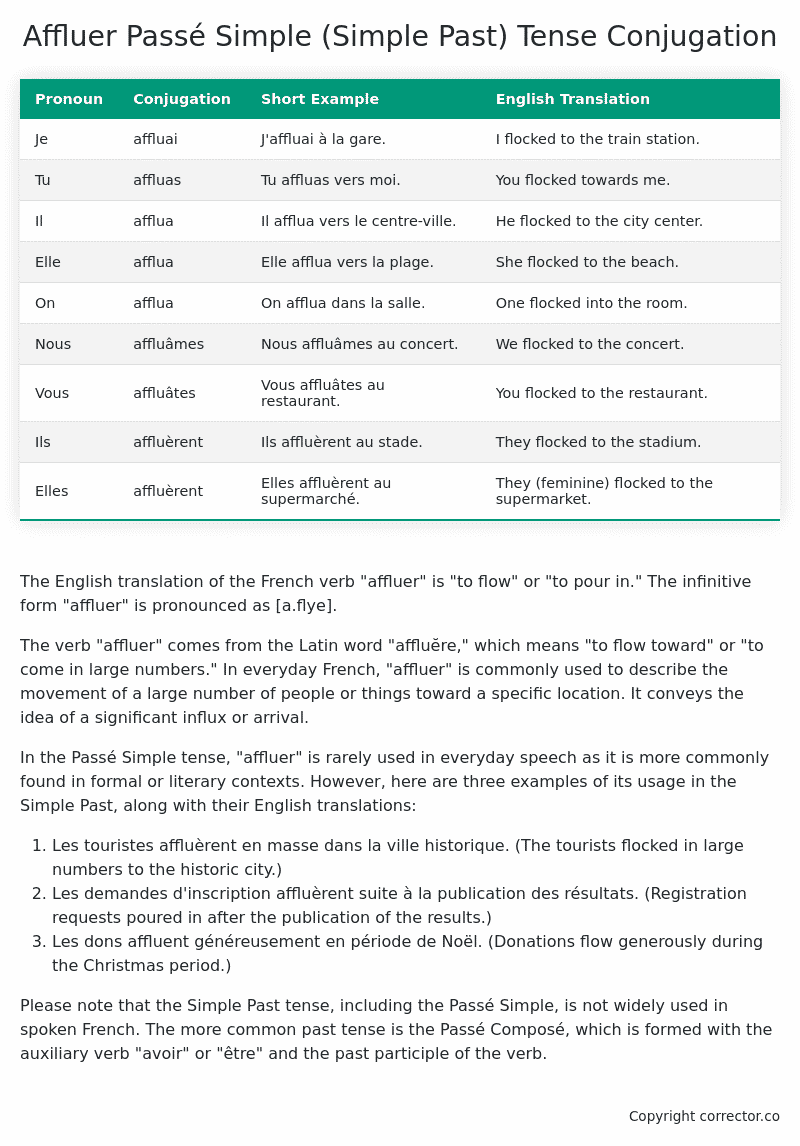Passé Simple (Simple Past) Tense Conjugation of the French Verb affluer
Introduction to the verb affluer
The English translation of the French verb “affluer” is “to flow” or “to pour in.” The infinitive form “affluer” is pronounced as [a.flye].
The verb “affluer” comes from the Latin word “affluĕre,” which means “to flow toward” or “to come in large numbers.” In everyday French, “affluer” is commonly used to describe the movement of a large number of people or things toward a specific location. It conveys the idea of a significant influx or arrival.
In the Passé Simple tense, “affluer” is rarely used in everyday speech as it is more commonly found in formal or literary contexts. However, here are three examples of its usage in the Simple Past, along with their English translations:
- Les touristes affluèrent en masse dans la ville historique. (The tourists flocked in large numbers to the historic city.)
- Les demandes d’inscription affluèrent suite à la publication des résultats. (Registration requests poured in after the publication of the results.)
- Les dons affluent généreusement en période de Noël. (Donations flow generously during the Christmas period.)
Please note that the Simple Past tense, including the Passé Simple, is not widely used in spoken French. The more common past tense is the Passé Composé, which is formed with the auxiliary verb “avoir” or “être” and the past participle of the verb.
Table of the Passé Simple (Simple Past) Tense Conjugation of affluer
| Pronoun | Conjugation | Short Example | English Translation |
|---|---|---|---|
| Je | affluai | J’affluai à la gare. | I flocked to the train station. |
| Tu | affluas | Tu affluas vers moi. | You flocked towards me. |
| Il | afflua | Il afflua vers le centre-ville. | He flocked to the city center. |
| Elle | afflua | Elle afflua vers la plage. | She flocked to the beach. |
| On | afflua | On afflua dans la salle. | One flocked into the room. |
| Nous | affluâmes | Nous affluâmes au concert. | We flocked to the concert. |
| Vous | affluâtes | Vous affluâtes au restaurant. | You flocked to the restaurant. |
| Ils | affluèrent | Ils affluèrent au stade. | They flocked to the stadium. |
| Elles | affluèrent | Elles affluèrent au supermarché. | They (feminine) flocked to the supermarket. |
Other Conjugations for Affluer.
Le Present (Present Tense) Conjugation of the French Verb affluer
Imparfait (Imperfect) Tense Conjugation of the French Verb affluer
Passé Simple (Simple Past) Tense Conjugation of the French Verb affluer (You’re reading it right now!)
Passé Composé (Present Perfect) Tense Conjugation of the French Verb affluer
Futur Simple (Simple Future) Tense Conjugation of the French Verb affluer
Futur Proche (Near Future) Tense Conjugation of the French Verb affluer
Plus-que-parfait (Pluperfect) Tense Conjugation of the French Verb affluer
Passé Antérieur (Past Anterior) Tense Conjugation of the French Verb affluer
Futur Antérieur (Future Anterior) Tense Conjugation of the French Verb affluer
Subjonctif Présent (Subjunctive Present) Tense Conjugation of the French Verb affluer
Subjonctif Passé (Subjunctive Past) Tense Conjugation of the French Verb affluer
Subjonctif Imparfait (Subjunctive Imperfect) Tense Conjugation of the French Verb affluer
Subjonctif Plus-que-parfait (Subjunctive Pluperfect) Tense Conjugation of the French Verb affluer
Conditionnel Présent (Conditional Present) Tense Conjugation of the French Verb affluer
Conditionnel Passé (Conditional Past) Tense Conjugation of the French Verb affluer
Conditionnel Passé II (Conditional Past II) Tense Conjugation of the French Verb affluer
L’impératif Présent (Imperative Present) Tense Conjugation of the French Verb affluer
L’impératif Passé (Imperative Past) Tense Conjugation of the French Verb affluer
L’infinitif Présent (Infinitive Present) Tense Conjugation of the French Verb affluer
L’infinitif Passé (Infinitive Past) Tense Conjugation of the French Verb affluer
Le Participe Présent (Present Participle) Tense Conjugation of the French Verb affluer
Le Participe Passé (Past Participle) Tense Conjugation of the French Verb affluer
Struggling with French verbs or the language in general? Why not use our free French Grammar Checker – no registration required!
Get a FREE Download Study Sheet of this Conjugation 🔥
Simply right click the image below, click “save image” and get your free reference for the affluer Passé Simple tense conjugation!

Affluer – About the French Passé Simple (Simple Past) Tense
Formation
Usage
Narration
Historical Context
Interactions with other tenses
Passé Composé
Imparfait
Conditional and Subjunctive
Summary
I hope you enjoyed this article on the verb affluer. Still in a learning mood? Check out another TOTALLY random French verb conjugation!


